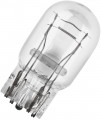The colour temperature of the light emitted by the lamp. The overall colour of the glow depends on this indicator; and note that the higher the colour temperature, the more “cold” the light looks, the closer it is to blue and blue. Traditional incandescent bulbs produce warm light at 2500-3000K, 3000-3500K can be described as "slightly warmer than neutral", neutral white corresponds to temperatures of
3700-4500K, higher values correspond to cooler shades, and temperatures
over 5000K characteristic of lamps with a blue (blue) colour of the glow.
Note that in this case the colour temperature of the lamp itself (more precisely, its filament or LED element) is indicated, and not the actual shade of the glow that it will give out; for the difference between these indicators, see "Glow colour". Also note here that it is possible to evaluate the shade of light by colour temperature in headlight lamps (see "Intended use"), for which the white colour of the glow is claimed. At the same time, this indicator has a very practical meaning: the warm colour of the light is considered optimal in wet weather, the neutral one gives the highest visible brightness, all other things being equal, and the cold “long-range” one can be subjectively pleasant for some drivers, and can also be used as an element of external tuning.
The maximum continuous lamp operation time. This indicator is quite approximate and the probability that the lamp will work during this period is approximately 1 in 3. This is due to the measurement technique: a control batch of lamps is used until 63.2% of them fail, the resulting time and indicated as "maximum service life". However, the Tc data compared to the B3 guaranteed life (see above) provides a good estimate of the overall lamp life and its ability to last beyond the guaranteed life.

